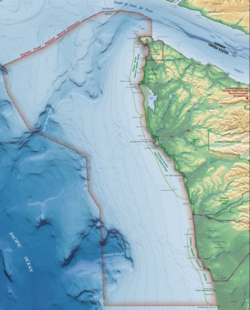The Quinault Canyon is a submarine canyon, off Washington state, in Olympic Coast National Marine Sanctuary.[1][2]
Quinault Canyon | |
|---|---|
 Quinault Canyon, at bottom, a bit left | |
| Coordinates: 47°21′00″N 125°08′00″W / 47.35°N 125.133333°W | |
| Area | |
| • Total | 378 square nautical miles |
The area
editIt lies opposite the Quinault Reservation.[3]
From the map, it is clear the Quinault River drains into the Pacific Ocean, opposite Quinault Canyon. The north of the Copalis National Wildlife Refuge is also a bit east, as are a few cities and sites, as Kalaloch, Queets, Taholah, Point Grenville (a headland), Moclips, and Pacific Beach. Also, Quinault, Washington and Lake Quinault are both onshore.
The canyon is dynamic area where humans do not detect massive submarine landslides which occur on its steep side walls, and the bottom collects sediment deposited from above.
Its dimensions
editQuinault Canyon is 25 kilometres (16 mi) from shore, [4] and is 378 square nautical miles in area.[5]
Nearby submarine canyons
editAll of the following submarine canyons are near, headed north to south:[6][7][2]
- Clayoquot Canyon
- Father Charles Canyon
- Loudon Canyon
- Barkely Canyon
- Nitinat Canyon
- Juan de Fuca Canyon
- Quileute Canyon
- Grays Canyon
- Guide Canyon
- Willapa Canyon
- Astoria Canyon
Of local submarine canyons, Quinault canyon is deepest.[7] Quinault Canyon has a maximum depth of 1,477 metres (4,846 ft).[8]
Quinault Canyon's relationships to volcanic eruptions
editBoth the 1980 eruption of Mount Saint Helens and the eruption of Mount Mazama in about 5677 BC left turbidites, in Quinault Canyon. [4]
On Quinault Canyon's role as a pathway
editQuinault Canyon has acted as a funnel for north- and northwestward-moving sediment along Washington’s continental shelf,[9] and it is a major pathway between the continental shelf of Washington and deep sea. Silt and clay originating from the Columbia River move down Quinault Canyon.[1]
On Quinault Canyon's aquatic life
editIt also serves as a conduit for dense, cold, nutrient-rich seawater pulling toward shore, where upwelling feeds surface productivity at the base of the food web.[10]
Due to productive topographically induced upwelling that occurs, Quinault Canyon is important for many fish, invertebrate, and whales. High relief is offered by boulders, vertical walls, and ridges. Rockfish have used this. As of June 14, 2016, there has been low sampling, but there are 14 records of
- corals,
- sponges, and
- pennatulids, including black coral and glass sponge.[11]
Quinault Channel
editA deep-sea channel, Quinault Channel, connects Quinault Canyon to Cascadia Channel. [12]
Exploration of Quinault Canyon
editAs of August 2017, there is an expedition to explore Quinault Canyon, something never before done. Results are forthcoming. Remotely operated underwater vehicles or autonomous underwater vehicles have never before explored Quinault and Quileute Canyons. These canyons are of great interest.
The mission is to map habitats that support many of the Quinault Nation’s treaty fisheries, sample for harmful algal blooms, to map the ocean floor, to check oxygen levels, and investigate ocean acidification.[13]
Methane seeps
editMethane seeps have been found, inside and near Quinault Canyon.[14][15]
See also
editLocal geography
edit- Abyssal fan
- Astoria Canyon
- Astoria Fan
- Cascadia Basin
- Cascadia Channel
- Cascadia Subduction Zone
- Grays Canyon
- Juan de Fuca Canyon
- Juan de Fuca Plate
- Juan de Fuca Channel
- Nitinat Canyon
- Nitinat Fan
- Quileute Canyon
- Willapa Canyon
Other useful links related to the name Quinault
edit- Lake Quinault
- Quinault Cultural Center and Museum
- Quinault River, a river located on the Olympic Peninsula in the U.S. state of Washington
- Quinault Pass
- Quinault Indian Nation
- Quinault language
- Quinault National Fish Hatchery
- Quinault people, an Indigenous people of the Pacific Northwest Coast
- Quinault Rainforest
- Quinault, Washington
- Quinault Indian Nation, a federally recognized tribe
- Quinault language, their language
- Quinault Treaty, signed in 1855
- SS Quinault Victory
References
edit- ^ a b K.W.Thorbjarnarson, C.A.Nittrouer, D.J.DeMaster (April 1986). "Accumulation of modern sediment in Quinault submarine canyon". Marine Geology. 71 (1–2): 107–124. Bibcode:1986MGeol..71..107T. doi:10.1016/0025-3227(86)90034-4.
{{cite journal}}: CS1 maint: multiple names: authors list (link) - ^ a b "Exploring Olympic Coast National Marine Sanctuary & Quinault Canyon". Nautilus Live. August 17, 2017. Retrieved 22 August 2017.
- ^ "elevationmap.net". Retrieved 22 August 2017.
- ^ a b "Updated Summary of Knowledge: Selected Areas of the Pacific Coast" (PDF). US Department of the Interior. July 2010. Retrieved 27 August 2017.
- ^ "NOAA Coast Survey". NOAA. Retrieved 26 August 2017.
- ^ B.M. Hickey. "Coastal Submarine Canyons" (PDF). School of Oceanography, University of Washington, Seattle, Washington. Retrieved 23 August 2017.
- ^ a b Steelquist, Robert (July 26, 2017). "Seafloor". NOAA. Retrieved 23 August 2017.
- ^ "Seafloor". olympiccoast.noaa.gov. Retrieved 22 August 2017.
- ^ M.R. Landry; B.M. Hickey (1 March 1989). Coastal Oceanography of Washington and Oregon. Elsevier. pp. 289–. ISBN 978-0-08-087085-4.
- ^ "Olympic Coast National Marine Sanctuary". National Marine Sanctuaries. 2008. Retrieved 24 August 2017.
- ^ "PROPOSAL OVERVIEW AND UPDATE Comprehensive Conservation Alternative to Modify U.S. West Coast Groundfish Essential Fish Habitat Conservation and Management" (PDF). usa.oceana.org. Retrieved 26 August 2017.
- ^ Brian F. Atwater and Gary B. Griggs (2012). "Deep-Sea Turbidites as Guides to Holocene Earthquake History at the Cascadia Subduction Zone— Alternative Views for a Seismic-Hazard Workshop" (PDF). USGS. Retrieved 11 September 2017.
- ^ "Never Explored Before Illuminating Quinault Canyon". Native News Online Staff. 25 Jul 2017. Retrieved 24 August 2017.
- ^ "E/V Nautilus Explores the Quinault Canyon Rim 2016". Olympic Coast National Marine Sanctuary. July 26, 2017. Retrieved 25 August 2017.
- ^ "Rainier Survey of Quinault & Quileute Canyons 2016". Olympic Coast National Marine Sanctuary. Retrieved 25 August 2017.